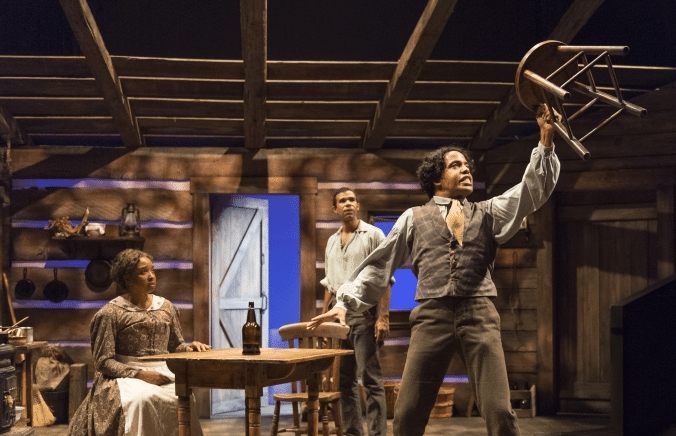By Charles Brousse
The use of morality as a guide in making and judging decisions is among the most important distinctions that separates humans from the instinct-driven rest of the animal kingdom. But the problem always has been, and undoubtedly always will be, “Whose morality?”
The truth of this is abundantly evident in Keith Josef Adkins’ Safe House, which just opened a month-long run at Berkeley’s Aurora Theatre. Drawing upon his own family’s history and continuing August Wilson’s exploration of African-Americans’ struggle for acceptance in a white-dominated country, Adkins serves up a vivid portrait of life on the border between the slave-owning South and the anti-slave North just before the Civil War. His characters, white and black, face daily moral choices that are difficult to resolve, but so do Aurora’s audiences, who apply 21st-century beliefs in evaluating their merit.
It’s 1843. Dorcas Pettigrew (Dawn L. Troupe) and her nephews Addison (David Everett Moore) and Frank (Lance Gardner) are freeborn blacks living in a small Northern Kentucky town along the Ohio River. Their geographical position near the terminus of the Underground Railroad that carried runaway slaves to abolitionist states makes them a natural stopover before the dangerous river crossing, but under Kentucky law, sheltering runaways also has its perils. A few years earlier, the local sheriff caught the Pettigrews in the act and they were placed under what amounts to house arrest. To provide some income, Addison, a cobbler and dry goods salesman, is allowed to make rounds in the black community; other than that, every aspect of their lives—even keeping their front door open or swimming in a nearby creek during hot weather—is subject to the sheriff’s whims, as enforced by his whiskey-swilling deputy Bracken (Cassidy Brown), who stops by frequently to enjoy Dorcas’ stews and pies.
That’s basically the setup as Adkins’ play opens. While Dorcas is stoical about the impending end of the family’s two-year semi-imprisonment (as she is just about everything in her life), her nephews have very different reactions. Addison dreams of marrying Clarissa (Dezi Soléy), a pretty young woman who occasionally visits them. They’ll have a family and he’ll make fine boots and shoes to sell in his own shop, just like the white folks. Frank (Lance Gardner), an impatient hothead, abhors the idea of settling down to work and domesticity. He does what he pleases, from swimming in the creek to seducing Clarissa, but a vague ambition to emigrate to Liberia—an African country established with American support as a home for freed slaves—leads him to agree with Addison’s urgent plea that they refrain from harboring any more runaways.
Then along comes Roxie (Jamella Cross), a rebellious teenager fleeing from her abusive Southern owner. Behind Addison’s back and breaking his pledge, Frank takes her in and the two scheme to cross the river together on their way to Liberia, leaving Dorcas and Addison to face the consequences.
To modern audiences, Frank’s decision to assist Roxie may absolve him from destroying his brother’s dream, and abandoning the family. As he says, how can you compare a person’s life with the ability to own a shop and make boots for the wealthy? On the other hand, Addison counters that he wants to show that not all black people are shiftless layabouts; all they need is an opportunity. Displaying a daring array of eccentricities, David Everett Moore is brilliant in the role. In fact, the entire ensemble, directed with a sure hand by L. Peter Callender, is excellent, and the scenic design by Kate Boyd, lit by Jon Tracy, and with costumes by Callie Floor, conveys a convincing sense of time and place.
To his great credit, playwright Adkins treats his characters and their foibles with respect and compassion rather than judgment. It’s as good a definition of morality as I can think of.
NOW PLAYING: Safe House runs through December 4 at the Aurora Theatre, 2081 Addison St., Berkeley; 510/843-4822; auroratheatre.org.








